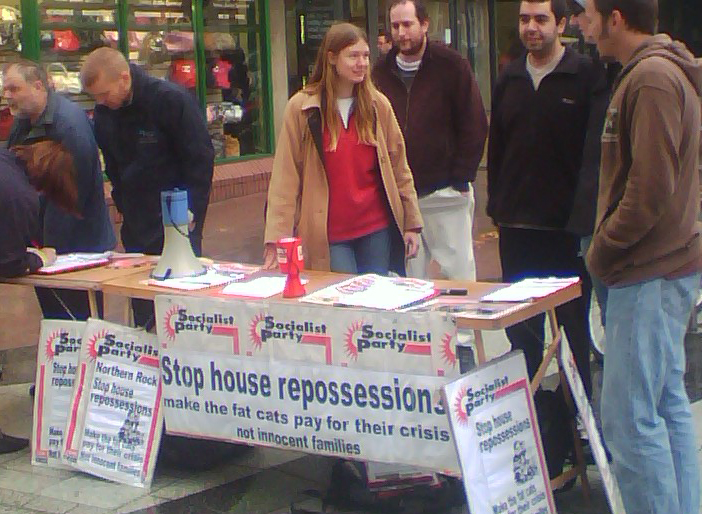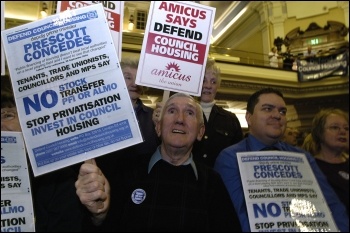Paul Kershaw, from Unite LE 1111 housing workers’ branch reveals the details of some of the Con-Dem attacks
Private renting: high rents, no security and bad conditions
Most young people in Britain now believe they will be unable to raise the mortgage they need to buy a home, according to a recent survey published by the Halifax bank.
Most of this “Generation Rent” wants to buy but they find themselves stuck in expensive private rented accommodation which is insecure and often in a terrible condition.
The private rented sector is growing, up 40% over the last five years and is now about as big as the ‘social’ sector and with more young tenants.
It’s hard to keep track of the flood of reports on housing in Britain that have made headlines recently. The Halifax surveyed 25-40 year olds and found that three-quarters of those who don’t own a property would like to, but nearly two-thirds believe that they have no chance of being able to buy.
A Joseph Rowntree Foundation report implies that these young people are too optimistic, estimating that just one in four will be able to buy homes in the future. A report from the Human City Institute found that 86% of under-30s identified home ownership as a key life goal and 90% said they would not be happy with a lifetime of renting.
Another report entitled ‘Forever Blowing Bubbles’, from the Institute for Public Policy Research, has warned that mortgages are still ‘too easy’ to get and calls for further restrictions to prevent a future crash.
Rents are now 4.4% higher than a year ago across the UK, reaching a monthly high of £692 in April. A report from Rightmove forecasts a 10% rise over the next year. In London the average weekly rent is now around £1,000 a month.
Rising rents have forced record numbers of young couples to share flats rather than get a place of their own. Over the past year alone the number of couples looking to share a flat with other tenants has soared by 81%, according to research by the easyroommate.co.uk website.
The Thatcher government abolished rent control in the 1980s deliberately to boost the private rented sector by making it more profitable. Now Thatcher’s heirs in the government blame tenants who claim housing benefits on high rent homes and are capping what they get in benefit. Sadly Labour simply argues that the measures are being introduced too quickly. Reintroducing rent control as an emergency measure needs to be an immediate demand for the labour movement.
What are tenants getting for their money? The English Housing Survey, published this year, shows that 1.5 million private rented homes failed to meet the government’s decent homes standard in 2009. Of these, 971,000 homes failed the standard because they had serious ‘Category 1’ hazards under the Housing Health and Safety Rating System.
Eviction
And private tenants have no real protection from arbitrary eviction as they are on short term tenancies. That makes it hard to plan your life and risky to complain about your accommodation as the landlord can solve the problem simply by booting you out! Secure tenancies in the private sector were ended by Thatcher; their reintroduction is another immediate demand that the labour movement should take up.
A Shelter survey investigating the impact of the cost of housing on 18-34 year olds shows that 22% of them have been forced to move back in with, or continue living with, their parents because they can’t afford to rent or buy their own home. 20% of this age group are delaying having children until they can afford to buy or rent their own home.
Enormous frustration and anger is building up about these conditions. The bosses have a growing fear of the potentially explosive political consequences of this sea change in the UK housing scene, partially reflected in the deluge of reports. Unfortunately the working class lacks a mass political force to give voice to this frustration and to pose an alternative.
The recent movements of young people across Europe, particularly in Spain and Greece, point to the potential that is building in the UK. Trade unionists resisting the Con-Dem cuts and fighting for an alternative will need to channel this mood into a fighting movement with a clear programme and a vision of an alternative.
There is a burning need to build new housing and bring existing housing up to scratch. As well as providing housing, this would create thousands of much-needed jobs. The banks should be fully nationalised and run to meet social need, giving low interest loans for house building. The benefit cuts should be reversed, rents should be capped, and proper secure tenancies should be reintroduced to the private rented sector.
Of course low and declining pay are key issues making housing unaffordable. Yet the TUC meekly welcomed the recent below inflation increase in the minimum wage – which particularly hits young workers – suggesting that the only alternative was higher youth unemployment.
Len McCluskey of Unite correctly described the increase as an insult: “There is no reason why younger workers should be paid less and have to struggle more to keep up with the cost of living – it’s tantamount to exploitation. Workers should be paid the rate for the job regardless of age. This is yet another attack on young people by this Tory-led government.”
It is not surprising that Citizens Advice report that homelessness-related enquiries from under 25s are up 14% on last year. Socialists will be arguing that unions must reject the TUC response and take up a fighting programme on housing and low pay. Len McCluskey’s words need to be turned into an energetic campaign.
Home ownership: debt and repossession
So far the UK has avoided the mass house repossessions seen in the US although, despite price falls, official measures of housing “affordability” have actually worsened. This reflects the impact of recession, pay cuts and job insecurity. But according to The Wall Street Journal (3 June 2011) UK residential property is still overvalued by about a third.
It says that the UK housing bubble puts the US bubble in the shade; and it hasn’t been deflated yet. Eventually, it warns, even London property prices will reflect the reality of British economics. The prospect is either a crash with a devastating impact on the wider financial system and economy, or a long drawn out agony stretching over decades such as Japan has been through.
Already the dream of home ownership is turning into a nightmare for many. In May the Council of Mortgage Lenders reported a 15% rise in repossessions and they expect this to go on rising.
Research by Shelter shows the number of homeowners struggling to pay their mortgage each month has increased by more than 78% in less than a year. As it comments: “Any rise in interest rates could be the trigger that finally pushes millions of homeowners into a spiral of debt, repossession and ultimately homelessness”.
The nightmare of negative equity and repossession currently dominating home owners’ lives in the US and Ireland would then arrive in the UK.
Housing benefit attacks are hitting hard
Already the housing benefit changes are starting to hit claimants but more cuts will hit people over the next few years. From next year ministers plan that claimants under 35 will only be given enough to rent a room instead of a one bedroom flat now, bringing them into line with the under-25s.
Official figures show that in Camden, the hardest hit area, people will lose an average of £116 a week.
From 2013, housing benefit will be cut for people in social housing who are deemed to be ‘under occupying’. They will lose an average of £13 a week.
The government’s own impact assessment estimates that 670,000 tenants will be affected. In the north, between 40-50% of tenants will be affected, in London around 20%.
Socialists argue that unions should campaign for the housing benefit proposals to be ditched. They should also link campaigning against low pay to the need for decent truly affordable housing.
It should be remembered that, as the recession bites, an increasing number of housing benefit claimants are in work, but their pay isn’t enough to pay for a roof over their heads. In London a third of claimants work.










